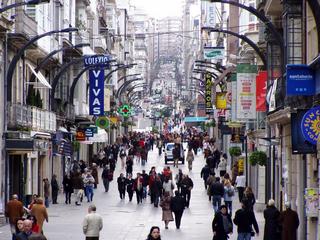Future gangster is "Don Corleone behind a laptop".
Published:
8 September 1999 y., Wednesday
In the next decade, the world_s crime fighters say they will fight international organized crime on several fronts, battling financial fraud, corruption, the sale of human beings for sex and labor and the trafficking of weapons of mass destruction. The focus of a three-day crime-fighting conference at Garmisch-Partenkirchen (Germany) sponsored by the FBI and the George C. Marshall European Center for Security Studies was touted in advance- as an assessment of organized crime_s impact on national security. But the meeting of American, European and Eurasian top brass ended Thursday with little open discussion of such forecasts. Organizers admitted the conference fell short of that objective, but said other goals had been achieved, namely the forging of new East-West relationships between law enforcement officials. One senior U.S. law enforcement official involved in planning the event told APBNews.com it was difficult to get officials from the former Soviet republics to open up and discuss their problems and worries over mobsters operating in their fledgling democracies. Author and criminologist Joseph Albini, of Indiana_s Wayne State University, said he estimates that as early as 2000, more than 90 percent of those involved in organized crime will be computer literate on some level. "The conception of Don Corleone [from the "Godfather" movies] smoking a cigar is better seen as Don Corleone behind a laptop," he said. It is the access to mass media information and the technology boom that are changing the face of mobsters from thugs to super-criminals, Albini said. Kulikov echoed that view. "We are at the threshold of a new millennium. We have to be prepared for the emergence of new types of criminal activity," including technological, he said. The retired Russian general clicked off a number of examples, including trafficking illegal genetically-engineered human organs and crop seeds. A senior intelligence officer from Great Britain who specializes in organized-crime analysis said tomorrow_s gangsters almost certainly will be consumed with electronic commerce, particularly online gambling, credit card fraud and virtual banking, where a financial institution exists solely in cyberspace. Another possibility, he said, is the theoretical notion of virtual-reality narcotics, which assumes it is possible to transmit a digital "stimulant" or hallucinogen across the Internet, creating a new form of addiction. "Biotechnology and information technology are the two biggest revolutions of this century, and we should look at each of them and see where the potential for money is from the criminal point of view," the official told APBNews.com, requesting anonymity.
Šaltinis:
APBNEWS.COM
Copying, publishing, announcing any information from the News.lt portal without written permission of News.lt editorial office is prohibited.
The most popular articles
 A famous New York church is feeling Wall Street's pain.
more »
A famous New York church is feeling Wall Street's pain.
more »
 Japan may be in recession, but Tokyo remains the world's best dining city.
more »
Japan may be in recession, but Tokyo remains the world's best dining city.
more »
 The Netherlands may be famous for its liberal drugs laws but in the Dutch town of Bergen Op Zoom they've had enough.
more »
The Netherlands may be famous for its liberal drugs laws but in the Dutch town of Bergen Op Zoom they've had enough.
more »
 A European Commission report published today shows that mobile workers from the countries that joined the EU in 2004 and 2007 have had a positive impact on Member States' economies and have not led to serious disturbances on their labour markets.
more »
A European Commission report published today shows that mobile workers from the countries that joined the EU in 2004 and 2007 have had a positive impact on Member States' economies and have not led to serious disturbances on their labour markets.
more »
 South Korean stores must by law charge shoppers for plastic bags. Any infrigement would be reported to the authorities.
more »
South Korean stores must by law charge shoppers for plastic bags. Any infrigement would be reported to the authorities.
more »
 Shi Sanba is one of China's most celebrated plastic surgeon's and also dubbed the country's "Michael Jackson".
more »
Shi Sanba is one of China's most celebrated plastic surgeon's and also dubbed the country's "Michael Jackson".
more »
 The job of elected Members of any Parliament is to make laws that all of us are obliged to obey.
more »
The job of elected Members of any Parliament is to make laws that all of us are obliged to obey.
more »
 In Spain thousands have been queuing for days in the hope of gaining that crucial first step onto the property ladder.
more »
In Spain thousands have been queuing for days in the hope of gaining that crucial first step onto the property ladder.
more »
 Scores of sheep have been shepherded through Paris as part of a demonstration to improve the lives of European farmers.
more »
Scores of sheep have been shepherded through Paris as part of a demonstration to improve the lives of European farmers.
more »
 Animal rights groups say animals are suffering from abuse and sometimes live in dire conditions.
more »
Animal rights groups say animals are suffering from abuse and sometimes live in dire conditions.
more »